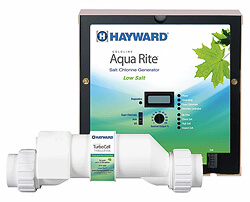FREE Standard Shipping On All Orders $100 or More!*
Salt Chlorine - a Good Fit for Your Family?

Eco-Friendly alternative to factory chlorine production allows you to make your own 'locally sourced and organic' chlorine, on-site.
Here's how it works: The slightly salty water passes through a salt chlorine generator; a stack of electrically charged metal plates converts the salt into chlorine, using electrolysis. After the chlorine molecule does it's work, it reverts back to the original components of just salt and water, where the process starts again.
Today's saltwater generators use sensors to monitor chlorine levels, salt levels, water temperature and water flow, and are completely computer controlled with easy to use digital interfaces. Mount the control box, plumb in the salt cell, and pour in the pool salt!
If your family is considering making the switch from a chlorine pool to an eco-friendly saltwater pool, keep reading to learn more:
Salt Chlorinators

Maintenance: Saltwater pools require weekly maintenance that includes monitoring salt concentration, pH and chlorine levels. The salt cell is a set of stacked metal plates that creates the chlorine.
Saltwater pool owners will not usually have to add chlorine to the pool, and saltwater generators are self-regulating, so there is often no need to shock the pool to remove chloramines. Salt pools may need to add small amounts of pool salt each year, to replace salt lost to backwashing, splash-out or winterization.
Salt cells only function when the filter pump is operating, so if you have pump or filter problems, you may need to use bleach, pool shock or tablets, until repairs are made. Salt pools may also use pool shock for spring openings, for algae treatment or stain removal.
And, salt cells don't work well in cold water - below 60°, you'll need other forms of chlorine. Specifically, at water temperatures below 60 degrees, conductivity of the salt is severely hampered. This causes the salt cell to work much harder to produce chlorine, which can shorten the lifespan of your salt cell.
Many salt chlorinators have a temperature sensor, which automatically reduces chlorine production when temperatures drop below 60 degrees, and stops production altogether when water temps reach 50 degrees. Other units have a Winter Mode, which is manually activated, to reduce production to around 20%. These are designed to protect the salt cell, to keep it from working too hard, which again, will shorten the lifespan of the expensive-to-replace salt cell.
Both chlorine and saltwater pools require the same chemical management, and still require balanced pool water; with proper Alkalinity, pH, Calcium Hardness, and chlorine Stabilizer levels. And even though a salt chlorinator monitors salt and chlorine levels, it's a good idea to cross-check with your own test kit. Salt levels can be tested with salt test strips.
Salt cells generally last 3-5 years before needing replacement. Salt cells last longer when they are oversized and under-worked, and cleaned regularly.

Cleanliness: Salt chlorine instantly kills harmful bacteria when it's introduced into pool water, converting to hypochlorous acid and hypochlorite ions that destroy contaminants in a matter of seconds.
The chlorine created by a salt chlorine generator is exactly the same as the chlorine released from tablets, shock or bleach. The disinfectant ability is equal as well, between salt chlorine and tablet chlorine.
I've heard it said that algae won't grow in a salt pool, but that's just not true, algae is a very adaptable species, and can grow in any type of pool when conditions are right. Salt pools that develop algae should begin a regular algaecide treatment, after shocking the pool appropriately.

Health: Exposure to chlorine chemicals can dry out the skin and hair and can give swimmers itchy, irritable skin. Saltwater pools avoid peaks and valleys in chlorination, reducing chloramine formation, which causes red eyes, skin and at times, lung irritation.
Chlorine chemicals need to be handled with care. Transporting, storing and using chlorine products can be hazardous, on many levels. Have you ever read the Precautionary Statements on a chlorine bucket? Chlorine products can be dangerous.
Although saltwater pools are not chlorine-free, many swimmers find that the water quality of saltwater pools to be more pleasant. This is because the slightly salty water is softer, although you won't taste it, and it won't burn your eyes like the ocean.

Expense. No matter which delivery system you choose, chlorine isn't free. Pool saltwater systems will initially cost more up-front to buy/install, but over time - the costs of chlorinating with a salt generator vs. tablet and shock chlorine is about the same.
I'd be remiss to not mention that salt water splash-out or drag-off can potentially damage certain types of very soft flagstone or travertine stonework. Sealing a stone pool deck or coping regularly will prevent damage and chalking from evaporated salt.
Pool decks of concrete, pavers or bricks however, are more resistant to salt from pool splash out and usually stand-up well without regular sealing or rinsing of the deck, especially in areas with regular rainfall.
Salt Chlorine Generator; Good Fit for Your Family?
The cost of installing a saltwater pool is higher than a traditional chlorine pool; however many consider swimming comfort and not having to store and handle (much) chlorine, as worth the additional expense.
You may still need to use some chlorine - if your salt system (or pump or filter) goes on the fritz, or for spring opening, or if you use the pool with cold water temperatures under 65° F. You can use tablets, granular or liquid chlorine, during these times, as needed.
Busy families will not have to worry as much about pool chlorine with a saltwater generator, which requires very little intervention.
A Salt Pool is a Chlorine Pool!
Saltwater systems make chlorine, the exact same chlorine that is released from pool chlorine products. In a saltwater pool, when H2O + NaOCl are run through the salt cell, the electric charge breaks apart molecules to create chlorine (Cl) and a few other byproducts, which are generally reabsorbed. The chlorine that is instantly created, hypochlorous acid, is the same exact chlorine that is released from chlorine tablets, liquid chlorine, or granular chlorine.
Saltwater Pools do have Benefits
- You can't taste the salt, but it can make the water feel softer
- Less storage and handling of hazardous chlorine products
- Breakpoint chlorination inside the cell reduces chloramines constantly
- Easily raise or lower chlorine levels, and view status on digital display
Saltwater Pools are not Maintenance Free Pools
- You still have to monitor the system, and test for salt, chlorine and stabilizer levels
- You still have to maintain good water balance; saltwater pool pH and Alkalinity rises rapidly
- Salt cells need cleaning to remove scale, although some systems do it automatically
- Salt cells last about 5 yrs; salt system parts like boards, sensors and switches may last longer
You may Still Need to Use Chlorine Products
- To raise chlorine level very fast for shock treatments
- To maintain chlorine level during pump, filter or salt system equipment problems
- To clear the water during opening or closing the pool, or for treating various water problems
Saltwater can attack Soft & Shiny Surfaces
- Galvanic corrosion can oxidize chrome surfaces in the pool, although sacrificial anodes can be used
- Salt residue can slowly corrode soft coping stones or stone decks, although sealers can be used
Although I'm known to preach the benefits of In The Swim chlorine, the use of a saltwater pool system is a perfectly logical alternative for pool disinfection.